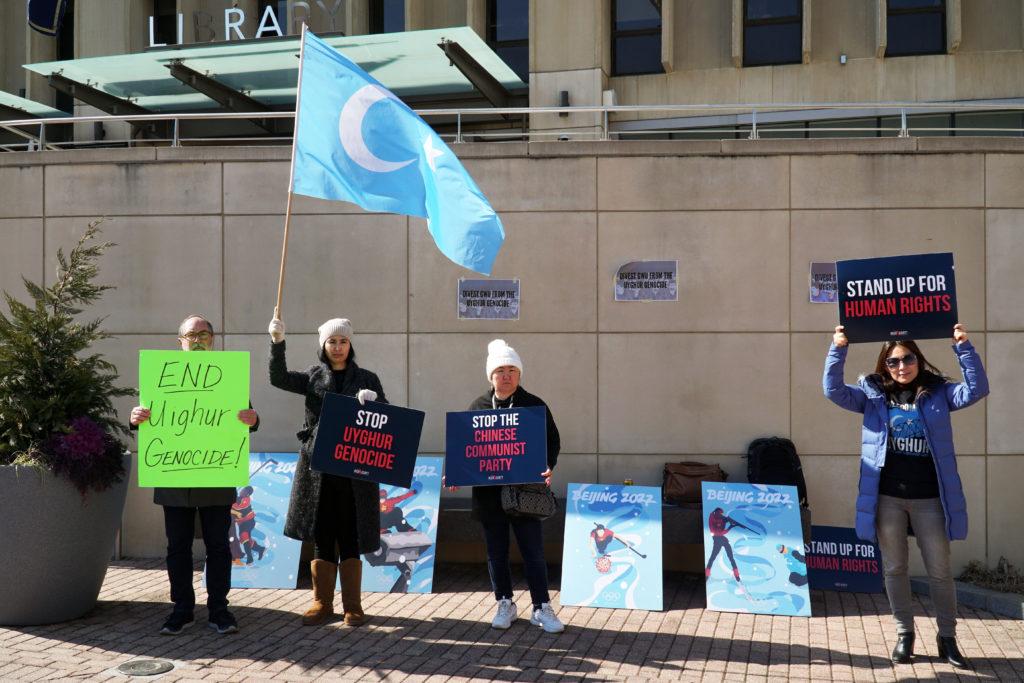Dozens of students and community leaders gathered in Kogan Plaza Tuesday to call on officials to divest GW’s endowment from companies accused of profiting from the Uyghur genocide.
A group of student organizations launched a petition last week, urging officials to audit University finances and divest any investments with companies that reportedly profit from forced labor practices in Western China. About a dozen protesters participated in the demonstration, carrying signs reading “Stop Uyghur genocide” and bearing the Kokbayraq – a flag representing the territory near East Turkestan and the Xinjiang region of China, where the Uyghur population is concentrated.
Student leaders at the demonstration criticized the University for accepting donations from foreign governments like China and Saudi Arabia, which have been accused of crimes against humanity in recent years. Protesters also included members of the Athenai Institute – a student-run nonprofit organization that opposes influence from the Chinese government on college campuses and helped organize the petition calling on GW to divest.
Juan Carlos Mora, the chair of the GW Committee on Divestment from the Uyghur Genocide, said comments that interim University President Mark Wrighton made earlier this month – which condemned a series of posters that criticized the Chinese government for the Uyghur genocide and drew national attention – alerted students of the need to call for divestment.
“We’re not going to say that GW is responsible for crimes against humanity,” Carlos said at the demonstration. “To rewind the tape a little bit right here on campus, we had a moment of reckoning, where President Wrighton expressed some comments that were unbecoming of a president of a liberal American university, and so that sparked action among a lot of students.”
At least 82 companies including the Volkswagen Group, Calvin Klein, Google, Amazon, Apple and Gap profit from factories that reportedly used the forced labor of Uyghurs, according to a report authored by the Australian Strategic Policy Institute in 2020.
Mora said the protests at GW follow similar movements at other D.C. higher education institutions, like Georgetown and Catholic universities, where administrators and student governments have demanded that officials divest from companies associated with crimes against humanity. Catholic University committed to divest from companies with ties to the genocide late last year in response to student outcry.
Mora said members of the Student Association are reluctant to debate the ongoing dispute surrounding GW’s potential investments in companies that profit from the Uyghur genocide because it is considered a politically controversial issue.
“I think that it’s time that the Student Association realized that saying, ‘We can’t deal with geopolitical issues’ is moral blasphemy and is moral bile,” he said. “As elected leaders, these are the issues that they should be dealing with, but I’m not going to put them in an impossible situation.”
Mora said although the petition does not have a signature goal or end date, he plans to continue organizing demonstrations and contacting administrators until University leaders deliver a formal response. The petition has garnered nearly 340 signatures as of Wednesday night.
“They can’t claim ignorance here – not only that we’ve been online, that these protests have happened, but we’re here in Kogan Plaza, but they’ve gotten emails about it,” he said. “So it’s frankly disappointing that they’re not even willing to respond at this point.”
Rory O’Connor, the founder of the Athenai Institute and a junior at Catholic University, said GW started distancing itself from Chinese influence when it shuttered the Confucius Institute on campus last July. But he said GW is still likely invested in companies “complicit” in the genocide because the large corporations that might enforce forced labor practices make up a significant portion of the University’s endowment.
“Considering that such companies as Tesla, and Hilton, Coca Cola and Heinz are all complicit in the genocide, if there was ever a university where students would be able to band together across partisan lines, not as a matter of right versus left, but up versus down, it would be at GW,” he said.
O’Connor said GW officials who have not responded to the petition’s demands do not appear very “concerned” with protecting their endowments or investigating its own financial investments. He said he hopes administrators will be compelled to take action when more students and community leaders get involved in the Uyghur divestment movement on campus.
“University administrators, full stop, should be those who are foremost concerned with protecting the integrity of their university endowment and ensuring that they are not, that their institution is not complicit in the Uyghur genocide,” he said.
Rachel Zemil, a junior at GW and member of the Athenai Institute, said the petitions’ signatories were planning public demonstrations before the controversy involving the posters criticizing the Chinese government.
“We feel that it’s important to make sure that the community knows what we stand for, and what we stand for is not only freedom of speech, but what we stand for the most is the freedom of the Uyghur people and their right to be treated with respect and to have their own state and to have their own lives,” she said.
Zemil said the Athenai Institute recently coordinated with survivors of the Uyghur genocide who escaped from China and fled to the District and New York and will soon join protests on campus calling for divestment from the genocide. She said the recent advocacy from student organizations drew inspiration from Catholic University, which committed to divest from companies with ties to the genocide last year.
“The thought process was Catholic’s divestment, we want to divest, we want other universities to follow suit, and we want this to be across all universities in the U.S.,” she said.








